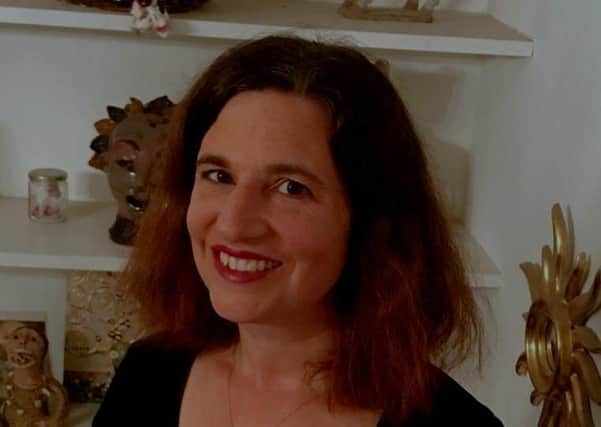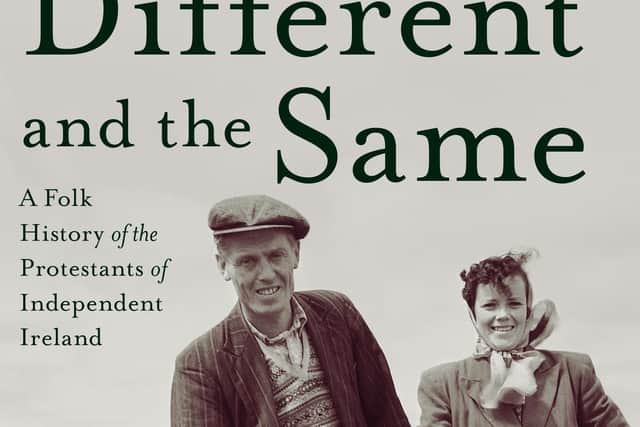Republic of Ireland still in denial about existence of its poor Protestants, says Dr Deirdre Nuttall in new book, ‘Different And The Same, A folk history of Protestants in Independent Ireland’


That is the key finding in Deirdre Nuttall’s new book, Different And The Same, A folk history of Protestants in Independent Ireland.
Dr Nuttall is an author and academic from New Ross in Co Wexford. She studied folklore and archeology at UCD and took a master’s degree in social anthropology at the University of Durham before completing her Phd in folklore/ethnology at UCD.
Advertisement
Hide AdAdvertisement
Hide AdDuring her academic career she became “very much aware” that a lot of “great research” from the 1930s-50s was mainly studying people from the Gaeltacht areas.


“But in the process I became aware the Protestant communities were not really studied as a cultural group.”
She added: “The general population of Ireland was more familiar with the general stereotype of Protestants as being quite wealthy aristocracy, wealthy lawyers and stuff like that.
”So I really wanted to give the voice to Protestants from more ordinary backgrounds and hear their experience of being Irish in these generations.”
Advertisement
Hide AdAdvertisement
Hide AdFrom farming stock, Dr Nuttall is not Protestant but has many Protestant ancestors.
”I did grow up hearing stories from my grandparents about their own parents’ experience of the 1920s and 30s. I was aware of these stories that Protestants tended to tell within the family but which weren’t usually written about. It was not something that you would see reflected in the history books.”
Now, she has interviewed 100 people and received 75 written contributions, of Protestants talking about oral history passed down their family lines.
KEY FINDING
The main finding she uncovered, she says, was the reality of poor Protestants in the Republic.
Advertisement
Hide AdAdvertisement
Hide Ad“One of the biggest things is socioeconomic diversity. It is still very challenging for a lot of people to accept that some Protestants had historically been poor. There is both urban and rural working class within the Protestant community in the Republic. For a lot of people that is still quite a challenging concept.
”Obviously the Protestant community was over represented in the wealthier classes but those classes don’t represent the totality of the population. That was a major point.”
She is not aware of any statistics on the subject, because the details were often overlooked in census records, she says.
”Typically we are talking about smaller farmers, shop workers, people with a post office franchise, or maybe a haberdashery in a market town or living in inner city Dublin.”The banks were dominated by wealthy Protestants who tended to hire Protestants as janitors and for those types of positions.
Advertisement
Hide AdAdvertisement
Hide Ad“It is an oral history so much of the information was people’s memories and their parents and grandparents. So most data covers the past 100-120 years but people do have stories handed down about 1798 or different major events in Irish history.”
COMMON THREAD
There was a clear common thread in the stories she heard.
“In the early years of the state the Protestant community became quite inward looking for complicated historical reasons.”
But now that the Republic has celebrated 100 years, the nation has changed and Protestants are now more comfortable talking openly about their grandparents’ memories, she says.
”People are talking about things that maybe they previously felt uncomfortable discussing.”
PERSECUTION
Advertisement
Hide AdAdvertisement
Hide AdAsked if there were memories of violent or subtle persecution, she replies that the extent of murders of Protestants in the 1920s is “hotly debated”.
“There were stories of people feeling persecuted and feeling discriminated against but I have to say that there were also stories of Protestant bigotry. Some people told her about sectarian jokes Protestants told about Catholics in the 1930s and 1940s.”
They also recounted memories of outright violence, to more subtle discrimation by the Catholic majority.
She added: “There were feelings that the state could sometimes be sectarian in terms of giving jobs in the public sector. People did feel that they were sometimes being overlooked for jobs in the public sector.
Advertisement
Hide AdAdvertisement
Hide Ad“But equally Protestant employers could be very sectarian in their hiring practises and that continued to be the case until maybe the 1970s.
“People also really wanted to talk about ‘Ne Temere’ and the effects it had on them and their families.”
The decree by the Catholic church required that in a mixed marriage the children had to be brought up Catholic.
”Objections came not just from the Catholic church [to mixed marriage] but also from within Protestant communities.”
MOST SURPRISING FINDING
Advertisement
Hide AdAdvertisement
Hide AdPerhaps the most surprising thing she found was the number of Protestants who maintained friendships with members of the 1920s IRA.
”One of the things that surprised me was in the 1920s, which was obviously a difficult time for a lot of Protestant families, a lot of people referenced the fact that they were friendly with members of the old IRA from that time.Protestant interviewees recounted how they recognised their political differences. But everyone also knew that at some point this was going to end and they would go back to working in the fields together, especially in country places where you would share a horse or a plough.
”People were talking about how - obviously the twenties were a difficult time - but someone they knew [in the IRA] would put in a good word so nothing bad would happen to them. Or the IRA would commandeer their car but they would always return it with a full tank of petrol. I was not expecting any positive commentary about the IRA in the 1920s but there was actually quite a bit.”
FEAR AND THREATS
But Protestant memories of the IRA in the 1920s was not all positive.
Advertisement
Hide AdAdvertisement
Hide Ad”There were negative memories as well, people being afraid that they would be shot or that there would be reprisals against them. These memories were very variable from one part of the country to the other. Some parts were quite peaceful and other parts - famously Cork - had a lot of trouble.
”Memories on this subject mostly related to “threatened violence” rather than actual violence, she said. ”Many people had heard about actual violence happening to other people in other towns. “
WHAT ABOUT THE EMIGRANTS?
Robin Bury in his recent book Buried Lives, uncovered public records of mass emmigration by Protestants in the 1920s due to persecution, but presumably that experience is missing from the book by definition, because only families who felt safe to remain were still in the Republic to be interviewed?
”Yes that is true but the book does touch on it when people talk about relatives emigrating. The Protestant emigration levels were higher than the Catholic ones, that is discussed in the book.”
THE FUTURE OF PROTESTANTS
Advertisement
Hide AdAdvertisement
Hide AdShe concludes that over the past three or four generations Protestants in the Republic “had to go through a period of reinventing themselves”.
There had always been some Irish nationalists among them, but in the 1920s the majority would have been “fairly passively” unionist.”But over subsequent years most families have gradually tended to align themselves more and more with The Irish state.”
Looking to the future, she sees the climate will be very different for Protestants.
”Because the Republic of Ireland is a very secular place now, no matter what your background, so identifying yourself in denominational terms in a declining thing.”
NEXT RESEARCH - NORTHERN PROTESTANTS?
Advertisement
Hide AdAdvertisement
Hide AdShe agrees that such painful memories will have left scars on the psyche of Protestants who moved to Northern Ireland and will still shape how one community relates to another.
”Yes. In independent Ireland the wealthy Protestants fared quite well. The state didn’t want the wealthy Protestants to leave because they had all the capital. So the state was very generous to big business families.
“But it was the smaller less wealthy Protestants who were really not really catered to very well and they felt a lot of resentment towards wealthy protestants as well as towards elements of the state.”
It would be worth exploring how such negative experiences might still impact on community relations today between north and south, she says.
Advertisement
Hide AdAdvertisement
Hide Ad“The memories are still alive and people still do talk about them. It would be interesting to do a follow on volume to talk to the diaspora of people descended from those who went to Northern Ireland and other places. You would get a more complete picture then, a different point of view which would be very interesting and valuable.”
A message from the Editor:
Thank you for reading this story on our website. While I have your attention, I also have an important request to make of you.
Advertisement
Hide AdAdvertisement
Hide AdWith the coronavirus lockdown having a major impact on many of our advertisers - and consequently the revenue we receive - we are more reliant than ever on you taking out a digital subscription.
Subscribe to newsletter.co.uk and enjoy unlimited access to the best Northern Ireland and UK news and information online and on our app. With a digital subscription, you can read more than 5 articles, see fewer ads, enjoy faster load times, and get access to exclusive newsletters and content. Visit https://www.newsletter.co.uk/subscriptions now to sign up.
Our journalism costs money and we rely on advertising, print and digital revenues to help to support them. By supporting us, we are able to support you in providing trusted, fact-checked content for this website.
Alistair Bushe
Editor